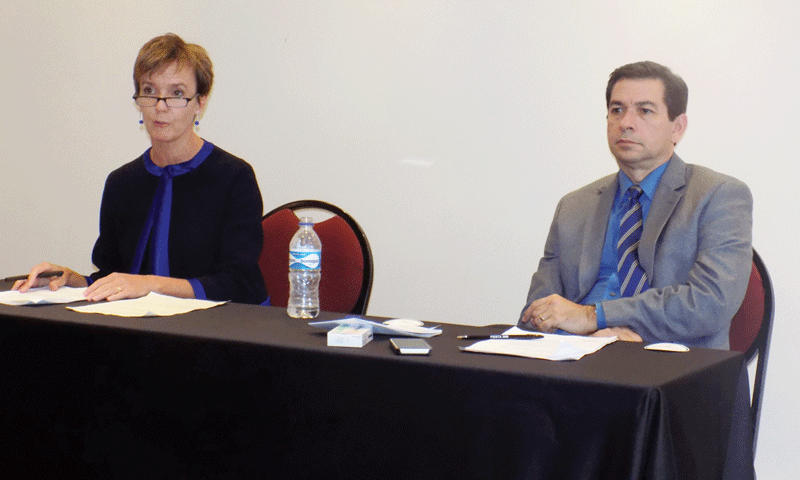
Economists warn of impending new taxes
With tax revenue projected to grow to N$30 billion in the 2012/13 fiscal year, up from the estimated N$26.3 billion in the current budget, economists have warned of new taxes likely to be introduced when Finance Minister Saara Kuugongelwa- Amadhila presents her 10th budget to Parliament next week.
Floris Bergh, portfolio manager at Old Mutual Investment Group Namibia (OMIGNAM) said the introduction of new taxes and tightening of existing taxes has been an ongoing thing since last year, hence he expects to see new taxes in the next budget.
“The Ministry of Finance started to look seriously into reforming and tightening on various taxes throughout the course of 2011. Without going into the details, it is clear that the tax take from the economy will increase further, be it from personal income taxes, corporate profit taxes and/or consumption taxes (VAT),” he says.
Klaus Schade, a researcher at economic think tank, IPPR, shares Bergh’s sentiments, adding that it was definite that there will be new taxes introduced in the forthcoming budget. “Yes, definitely. The Minister announced that the Environmental Taxes are at an advanced stage. Car owners can expect the introduction of a carbon tax that is in place in neighbouring countries such as Zambia.”
While not ruling out the introduction of new taxes, Tega Shiimi Ya Shiimi, CEO of Sanlam Investment Management Namibia, however said there appears to be limited room to increase the tax burden on the current base. He contends that at around 29% of GDP, tax revenue was relatively high. But, he concedes that this was not a guarantee that there will be no additional taxes introduced at some point in the near future.
“It seems one avenue that could be pursued is ‘green taxes’ on companies at some point in the future, although not necessarily in the upcoming budget. But, the introduction of such a tax would be in keeping with the National Climate Change Policy that had already been drafted at the time the budget was read last year.
“In theory, ‘green taxes’ should be used to alter behaviour rather than as a targeted revenue source. Hence, we still believe that taxes elsewhere should be cut to keep the overall tax burden unchanged and furthermore the time is ripe to strengthen and widen an already stretched tax base,” Ya Shiimi says.
Daniel Motinga, an Economist with FNB Namibia, believes that the 2012/2013 budget will likely be a continuation of the current budget. “I think the core themes of the previous MTEF will resonate through the new budget,” he says. Motinga, however, believes that there will be a more cohesive spending strategy on the Targeted Intervention Programme for Employment and Economic Growth (TIPEEG) agenda.
Bergh adds that it would be very interesting to see how things have turned out relative to what was budgeted and planned for in the current fiscal year – such as whether the budgeted growth of about 30% in total expenditure was achieved, whether the budgeted increase in total revenue of 23% was achieved, whether the total deficit would have amounted to nearly N$10 billion as it was foreseen and what progress has been made in respect of TIPEEG.
“I think much of what will transpire in the 2012/13 budget depends on developments of the current fiscal year. Furthermore, it will be interesting to note what Treasury’s macroeconomic assumptions are, that is to say what the estimate of real growth is for 2011 and for the coming MTEF period as well as other views such as on inflation, the global environment and monetary policy.
“I do not foresee scope for any tax relief. On the contrary, new taxes and/or tightening of tax rules will in all probability be announced. We look forward to clarity with respect to the domestic investment regulations for institutional investors,” Bergh says.
Ya Shiimi is of the opinion that, as a continuing theme from last year, the upcoming budget is likely “to seem tame.”
“The TIPEEG programme has been announced and certain strides have been achieved in the implementation phase. The challenge now should be on full implementation and adhering to the published Medium Term Expenditure Framework targets for 2011/12 to 2013/14,” he says.
In keeping with President Hifikepunye Pohamba’s New Year message, and against the backdrop of high and rising food prices, Ya Shiimi adds that there was likely to be a particular focus in the budget on food security and strengthening of the Green Scheme projects, including provision of farming inputs to subsistence farmers and perhaps measures to discourage imports of foods that are available locally with possibly a greater focus on infant industry protection (such as the 48% levy on broiler imports).
Although the Ministry of Finance has made concerted efforts to increase and improve tax revenue collection in the past fiscal year, analysts believe there was need for the Receiver to strengthen its technical capacity. “As noted, there are clearly efforts underway to increase and improve on the tax take. However, the Receiver can be strengthened more to become more efficient and professional in their operations, whilst closing various loopholes,” says Bergh.
Ya Shiimi says the Medium Term Expenditure Framework does refer that the State Finance Amendment Bill (2009) was finalised and specifically aims to address financial management in the public sector, including strengthening revenue collection.
“With amendments of SACU’s Revenue Sharing Formula, Namibia currently stands to receive a lesser portion from the customs revenue pool which has historically been governments’ largest source of revenue. It is hence prudent to review the current taxpayer base, seek practical and efficient collection methods and widen an already stretched taxpayer base,” he adds.
Ya Shiimi warns that the debt ratio should not be allowed to stray too high if government hopes to maintain its sovereign debt rating at its current level. He says that there were material advantages to constraining the government’s debt level.
“Together, low government debt levels and low inflation help keep the structure of interest rates low, which helps underpin investment and job creation,” Ya Shiimi adds.
Schade says while government has enforced stronger compliance with tax laws over the years, with the assistance of private sector auditors, there was need to strengthen internal capacity further to detect and close loopholes.
He however feels that the public deficit and public debts are sustainable at the envisaged level for the current MTEF period. He pointed out that despite an expansionary budget in the last few years, Namibia still has one of the lowest public debt to GDP ratio in the world. Namibia’s public debt as a ratio of GDP is expected to reach 30% in 2014 while the international benchmark is 60%.
Schade expects public deficit at the end of this fiscal year to be below the anticipated 10.7%, due to a lower than anticipated TIPEEG project execution rate and probably higher revenue.
Overall, the fiscal picture seems healthy.
“Total revenue is equal to about 30% of GDP, expenditure 40%, deficit 10% (but should decline) and total debt (including guarantees) foreseen to be around 35% to 40%. These ratios compare favourably to the situation in most other countries presently, especially the so-called developed nations of Europe, Japan and the USA.
“However, as always, vigilance is called for. One thing to watch is the wage bill. It has doubled from N$6 billion in 2006 to N$12 billion in 2012,” Bergh says.











































